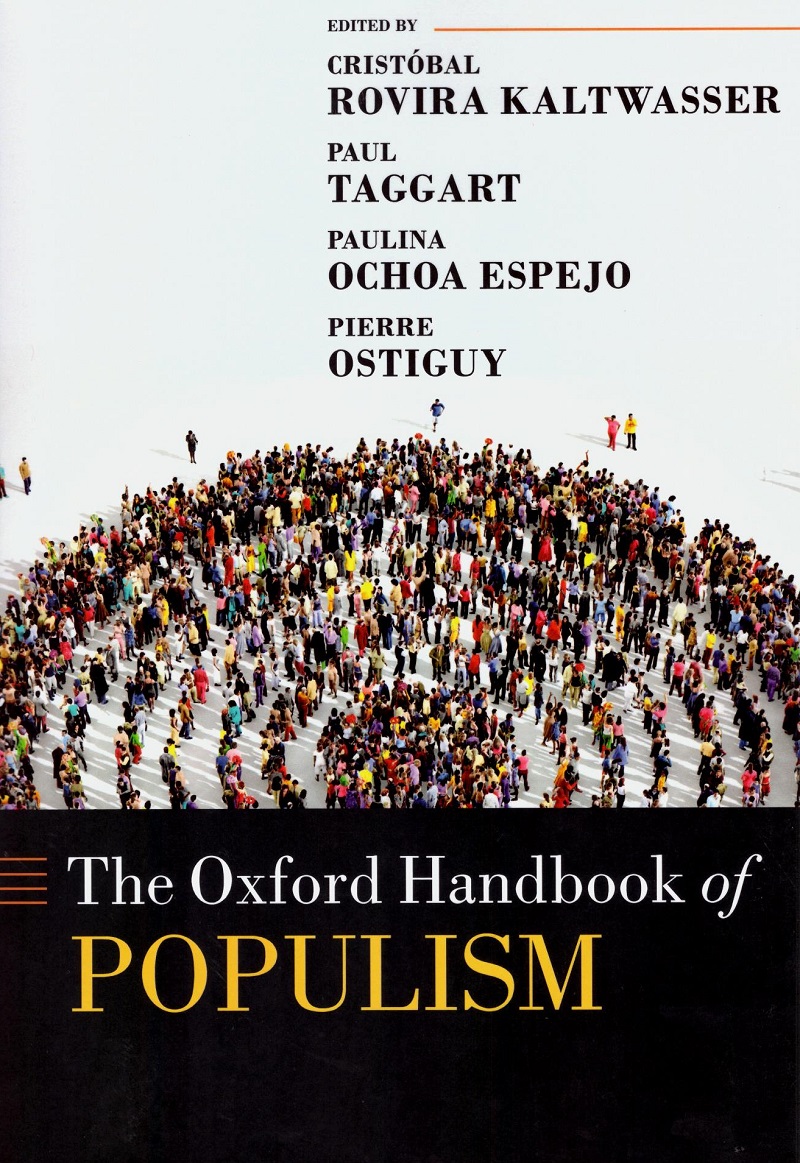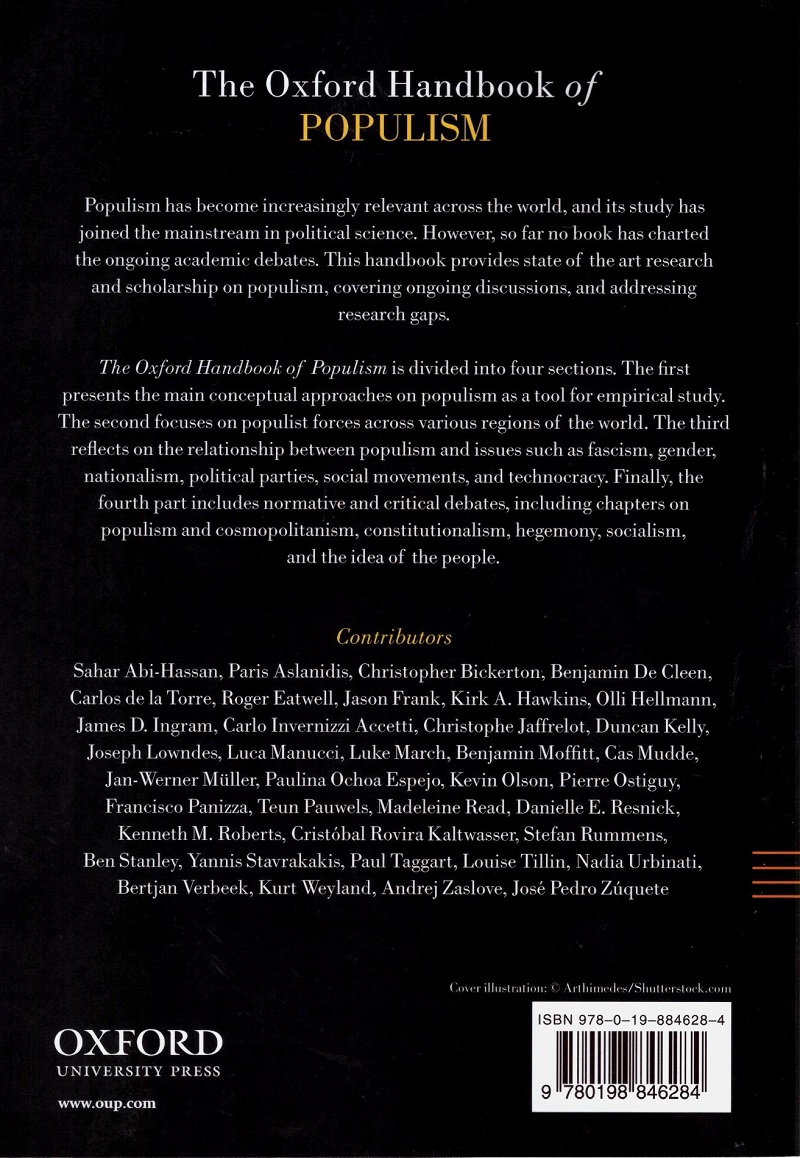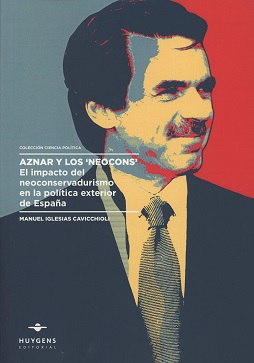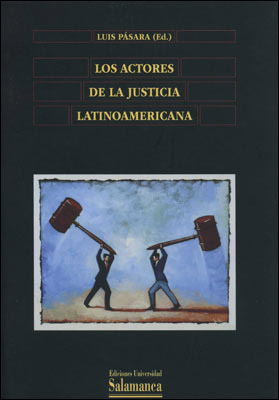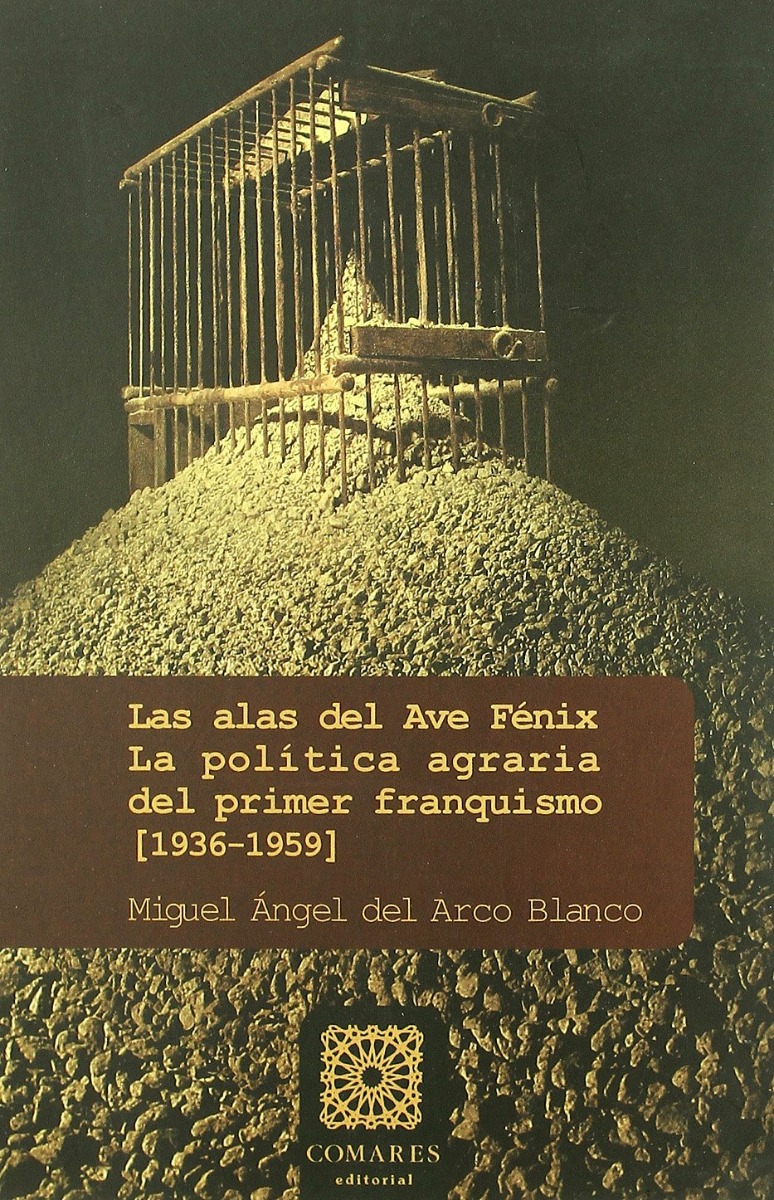Populist forces are becoming increasingly relevant across the world, and studies on populism have entered the mainstream of the political science discipline. However, so far no book has synthesized the ongoing debate on how to study the populist phenomenon. This handbook provides state of the art research and scholarship on populism, and lays out, not only the cumulated knowledge on populism, but also the ongoing discussions and research gaps on this topic.
IThe Oxford Handbook of Populism is divided into four sections. The first presents the main conceptual approaches on populism and points out how the phenomenon in question can be empirically analyzed. The second focuses on populist forces across the world and includes chapters on Africa, Australia and New Zealand, Central and Eastern Europe, East Asia, India, Latin America, the Post-Soviet States, the United States, and Western Europe. The third reflects on the interaction between populism and various relevant issues both from a scholarly and political point of view. Amongst other issues, chapters analyze the relationship between populism and fascism, foreign policy, gender, nationalism, political parties, religion, social movements and technocracy. Finally, the fourth part includes some of the most recent normative debates on populism, including chapters on populism and cosmopolitanism, constitutionalism, hegemony, the history of popular sovereignty, the idea of the people, and socialism.
The handbook features contributions from leading experts in the field, and is indispensible, positioning the study of populism in political science.
Preface
1: Populism: An Overview of the Concept and the State of the Art, Cristóbal Rovira Kaltwasser, Paul Taggart, Paulina Ochoa Espejo, and Pierre Ostiguy
Concepts
2: Populism: an Ideational Approach, Cas Mudde
3: Populism: a Political-Strategic Approach, Kurt Weyland
4: Populism: a Socio-Cultural Approach, Pierre Ostiguy
Regions
5: Populism in Africa, Danielle Resnick
6: Populism in Australia and New Zealand, Benjamin Moffitt
7: Populism in Central and Eastern Europe, Ben Stanley
8: Populism in East Asia, Olli Hellmann
9: Populism in India, Christophe Jaffrelot and Louise Tillin
10: Populism in Latin America, Carlos de la Torre
11: Populism in the Post-Soviet States, Luke March
12: Populism in the United States, Joseph Lowndes
13: Populism in Western Europe, Paul Taggart
Issues
14: Populism and its Causes, Kirk A. Hawkins, Madeleine Read, and Teun Pauwels
15: Populism and Political Parties, Kenneth Roberts
16: Populism and Social Movements, Paris Aslanidis
17: Populism and Technocracy, Christopher Bickerton and Carlo Invernizzi Accetti
18: Populism and Nationalism, Benjamin de Cleen
19: Populism and Fascism, Roger Eatwell
20: Populism and Foreign Policy, Bertjan Verbeek and Andrej Zaslove
21: Populism and Identification, Francisco Panizza
22: Populism and Gender, Sahar Abi-Hassan
23: Populism and Religion, Jose Pedro Zúquete
24: Populism and the Media, Luca Manucci
25: Populism and the Question of How To Deal With It, Cristóbal Rovira Kaltwasser
Normative Debates
26: Populism and the History of popular Sovereignty, Duncan Kelly
27: Populism and Hegemony, Yannis Stavrakakis
28: Populism as a Threat to Liberal Democracy, Stefan Rummens
29: Populism and the Principle of Majority, Nadia Urbinati
30: Populism and Constitutionalism, Jan-Werner Mueller
31: Populism and the Idea of the People, Paulina Ochoa Espejo
32: Populism and Praxis, Jason Frank
33: Populism and Cosmopolitanism, James D. Ingram
34: Populism in the Socialist Imagination, Kevin Olson
Edited by Cristóbal Rovira Kaltwasser, Associate Professor of Political Science, Diego Portales University, Santiago, Chile, Paul A. Taggart, Professor of Politics and Jean Monnet Chair, University of Sussex, Paulina Ochoa Espejo, Associate Professor of Political Science, Haverford College, and Pierre Ostiguy, Assistand Professor of Political Studies, Universidad Católica de Chile
Cristóbal Rovira Kaltwasser is a Professor of Political Science at Diego Portales University in Santiago de Chile and an Associate Researcher at the Centre for Social Confl ict and Cohesion Studies (COES). His publications include Populism: A Very Short Introduction (with Cas Mudde, OUP, 2017), and has published articles in journals such as Comparative European Politics, Comparative Political Studies, Democratization, Government & Opposition, Party Politics and Political Studies.
Paul Taggart is Professor of Politics and Jean Monnet Chair, Director of the Sussex European Institute at the University of Sussex, former editor of Government and Opposition, former editor of the journal Politics, co-convenor (with Prof. Aleks Szczerbiak) of the European Referendums, Elections and Parties Network (EPERN). His publications include The New Populism and The New Politics (Palgrave, 1996), Populism (OUP, 2000) and Opposing Europe? The Comparative Party Politics of Euroscepticism, Vols I and II (co-edited with Aleks Szczerbiak, OUP, 2008).
Paulina Ochoa Espejo is an Associate Professor of political science at Haverford College. Her publications include The Time of Popular Sovereignty: Process and the Democratic State (Penn State University Press, 2011) and has publsihed articles in journals such as the American Journal of Political Science, the Journal of Political Philosophy and the Journal of Politics.
Pierre Ostiguy is Professor of Political Science and International Relations at the Universidad Católica de Córdoba (Argentina). He has published several book chapters on populism, articles in journals including The Brown Journal of World Aff airs (with Kenneth Roberts), POSTData (Argentina), Politique et Sociétés (Québec), and the Revue Internationale de Politique Comparée (Europe) as well as longer texts as Kellogg Institute Working Papers.
Contributors:
Sahar Abi-Hassan, Boston University.
Paris Aslanidis, Yale University.
Christopher Bickerton, University of Cambridge.
Benjamin De Cleen, Vrije Universiteit Brussel.
Carlos de la Torre, University of Kentucky.
Roger Eatwell, Cornell University.
Jason Frank, Cornell University.
Kirk A. Hawkins, Brigham Young University.
Olli Hellmann, University of Sussex.
James D. Ingram, McMaster University.
Carlo Invernizzi Accetti, City University of New York.
Christophe Jaffrelot, CERI-Sciences Po/CNRS.
Duncan Kelly, University of Cambridge.
Joseph Lowndes, University of Oregon, USA.
Luca Manucci, University of Zurich.
Luke March, University of Edinburgh.
Benjamin Moffitt, Uppsala University.
Cas Mudde, University of Georgia.
Jan-Werner Müller, Princeton University.
Paulina Ochoa Espejo, Haverford College.
Kevin Olson, University of California, Irvine.
Pierre Ostiguy, Universidad Católica de Chile.
Francisco Panizza, The London School of Economics and Political Science.
Teun Pauwels, Université Libre de Bruxelles.
Madeleine Read, Brigham Young University.
Danielle Resnick, International Food Policy Research Institute.
Kenneth M. Roberts, Cornell University.
Cristóbal Rovira Kaltwasser, Diego Portales University.
Stefan Rummens, KU Leuven.
Ben Stanley, SWPS University of Social Sciences and Humanities.
Yannis Stavrakakis, Aristotle University of Thessaloniki.
Paul A. Taggart, University of Sussex.
Louise Tillin, King’s College London.
Nadia Urbinati, Columbia University.
Bertjan Verbeek, Radboud University Nijmegen.
Andrej Zaslove, Radboud University Nijmegen.
Jose Pedro Zuquete, University of Lisbon.

